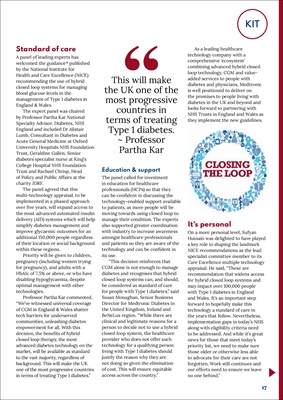
17
KIT
Standard of care
A panel of leading experts has
welcomed the guidance* published
by the National Institute for
Health and Care Excellence (NICE)
recommending the use of hybrid
closed loop systems for managing
blood glucose levels in the
management of Type 1 diabetes in
England & Wales.
The expert panel was chaired
by Professor Partha Kar National
Specialty Advisor, Diabetes, NHS
England and included Dr Alistair
Lumb, Consultant in Diabetes and
Acute General Medicine at Oxford
University Hospitals NHS Foundation
Trust, Geraldine Gallen, Senior
diabetes specialist nurse at King's
College Hospital NHS Foundation
Trust and Rachael Chrisp, Head
of Policy and Public Affairs at the
charity JDRF.
The panel agreed that this
multi-technology appraisal, to be
implemented in a phased approach
over five years, will expand access to
the most advanced automated insulin
delivery (AID) systems which will help
simplify diabetes management and
improve glycaemic outcomes for an
additional 150,000 people regardless
of their location or social background
within these regions.
Priority will be given to children,
pregnancy (including women trying
for pregnancy), and adults with a
HbA1c of 7.5% or above, or who have
disabling hypoglycaemia, despite
optimal management with other
technologies.
Professor Partha Kar commented,
"We've witnessed universal coverage
of CGM in England & Wales shatter
tech barriers for underserved
communities, unleashing diabetes
empowerment for all. With this
decision, the benefits of hybrid
closed loop therapy, the most
advanced diabetes technology on the
market, will be available as standard
to the vast majority, regardless of
background. This will make the UK
one of the most progressive countries
in terms of treating Type 1 diabetes."
Education & support
The panel called for investment
in education for healthcare
professionals (HCPs) so that they
can be confident in discussing the
technology-enabled support available
to patients, as more people will be
moving towards using closed loop to
manage their condition. The experts
also supported greater coordination
with industry to increase awareness
amongst healthcare professionals
and patients so they are aware of the
technology and can be confident in
its use.
"This decision reinforces that
CGM alone is not enough to manage
diabetes and recognises that hybrid
closed loop systems can, and should,
be considered as standard of care
for people with Type 1 diabetes," said
Susan Monaghan, Senior Business
Director for Medtronic Diabetes in
the United Kingdom, Ireland and
BeNeLux region. "While there are
clinical and legitimate reasons for a
person to decide not to use a hybrid
closed loop system, the healthcare
provider who does not offer such
technology for a qualifying person
living with Type 1 diabetes should
justify the reason why they are
not doing so given the elimination
of cost. This will ensure equitable
access across the country."
As a leading healthcare
technology company with a
comprehensive 'ecosystem'
combining advanced hybrid closed
loop technology, CGM and valueadded
services to people with
diabetes and physicians, Medtronic
is well positioned to deliver on
the promises to people living with
diabetes in the UK and beyond and
looks forward to partnering with
NHS Trusts in England and Wales as
they implement the new guidelines.
This will make
the UK one of the
most progressive
countries in
terms of treating
Type 1 diabetes.
~ Professor
Partha Kar
It's personal
On a more personal level, Sufyan
Hussain was delighted to have played
a key role in shaping the landmark
NICE recommendations as the lead
specialist committee member to its
Care Excellence multiple technology
appraisal. He said, "These are
recommendation that widens access
for hybrid closed loop systems and
may impact over 100,000 people
with Type 1 diabetes in England
and Wales. It's an important step
forward to hopefully make this
technology a standard of care in
the years that follow. Nevertheless,
implementation gaps in today's NHS
along with eligibility criteria need
to be addressed. And while it's great
news for those that meet today's
priority list, we need to make sure
those older or otherwise less able
to advocate for their care are not
forgotten. Work still continues and
our efforts need to ensure we leave
no one behind."